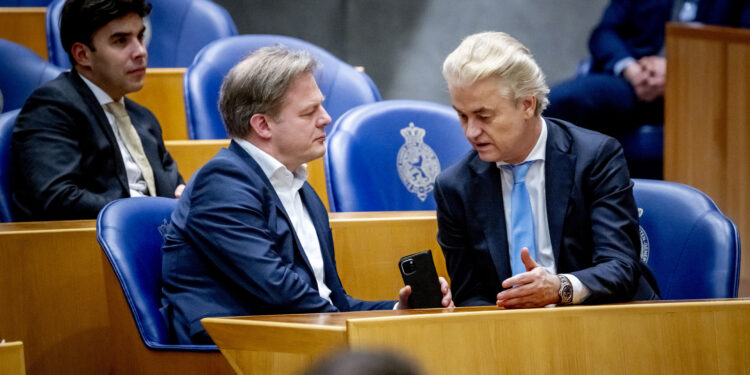Brussels – With extreme hardship, with goodbyes, and comebacks at the negotiating tables, with the most charismatic (and controversial) leader stepping down as prime minister. Almost six months since early elections, which saw the far-right, anti-immigration, anti-Islamic and strongly Euroskeptic PVV (Party for Freedom) party triumph, the Netherlands is set for a new coalition government skewed to the right. As reported by Dutch broadcaster Nos, the far-right party has reached a government agreement called Hope, Courage, and Pride with the liberals of the People’s Party for Freedom and Democracy (VVD), the center-right New Social Contract (NSC), and the Civic-Farmer Movement (BBB), which this morning (May 16) will be submitted to the Presidency of the Tweede Kamer (the lower house of the Netherlands’ national Parliament).

“We have reached an agreement with the negotiators,” the leader of the far-right party, Geert Wilders, told the press yesterday afternoon (May 15), who in the course of long and difficult negotiations had to give up becoming the next Prime Minister of the Netherlands while pushing for a right-wing coalition that would include the PVV. At the moment it is unclear who will be the head of the cabinet, negotiations are still ongoing, and Wilders himself cut short on reporters’ questions: “Discussions about the Prime Minister will be held at a later date.” At this point, the government program – which for now has not been made public – will be presented and debated next week in Parliament, testing how compact the majority is (minimum 76 out of 150 MPs). In addition to the 37 far-right nationalists of the Party for Freedom, the future government is expected to count on the support of the seven farmer populists of BBB, the 24 liberals of VVD and the 20 center-right of the NSC, leaving the coalition between the Labor Party and the Green Left GroenLinks (PvdA/Gl) to lead the opposition along with 10 other smaller parties.

But the fallout from the government agreement in the Netherlands at the European level is already heavy. A week ago, the leaders of the Progressive Alliance of Socialists and Democrats (S&D), Renew Europe, the Greens/Ale and the Left signed a joint statement pledging not enter coalitions with the far right “at any level.” However, the People’s Party for Freedom and Democracy (VVD) is a member of the Alliance of Liberals and Democrats for Europe (ALDE) party and the Renew Europe group in the EU Parliament. Both the emerging center-right New Social Contract (NSC) party and the Civic-Country Movement (BBB) have signaled their intention to join the European People’s Party (criticized for not signing the joint declaration). “This is a shocking betrayal of liberal and democratic values,” the Greens Spitzenkandidaten in the June European elections, Terry Reintke and Bas Eickhout lashed out: “This move by the Dutch liberals and conservatives is also in clear contradiction to last week’s joint declaration.”
Wilders’ party not only wants to “ban” mosques, Korans, and Islamic schools in the country and “expel” Dutch dual nationals who commit crimes, but also call for a referendum to leave the European Union. The aspiration for “Nexit” (from Netherlands plus exit) in one of the founding member states of the Union worries not only pro-European parties in the Netherlands, but especially EU institutions in Brussels. “The far right will never be able to come to power on its own,” the European Greens make clear, with a lunge at the center-right: “For a long time we could count on liberals and conservatives to keep the far right out of power, now it seems that cynicism, opportunism, and indifference have taken hold among them as well.”
What happened in the last election in the Netherlands
According to the official results of the Nov. 22, 2023 vote, the far-right PVV party recorded the most convincing electoral test in its history, becoming the first force in Parliament and claiming the leadership of the Netherlands: with 23.5 percent of the vote, it was eight percentage points ahead of the coalition between the Labor Party and the Green Left GroenLinks, led by the former head for the European Green Deal in the EU Commission, Frans Timmermans. Despite the increase in votes (+4.7 percent) compared to the last election in 2021 – when the two forces ran divided – the red-green coalition came in second place with 25 seats, behind the PVV’s 37.
Third place went to the center-right of the People’s Party for Freedom and Democracy (which in spite of its name is not part of the European People’s Party family, but of the liberals of Renew Europe), with a 6.7 percentage point drop and 10 fewer seats at the Tweede Kamer (from 34 to 24). Same fate for the liberals of Democraten 66 (from 24 to 9 seats) and the Christian Democrats of Christian Democratic Appeal(from 15 to 5). A feat for the new center-right New Social Contract formation, which came in fourth with 12.8 percent and 20 seats. Also noteworthy was the advance of the County Civic Movement – a populist party that advocates farmers’ interests – with seven seats (+6 from last term).
English version by the Translation Service of Withub






